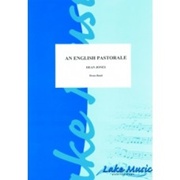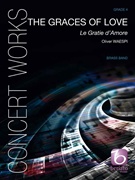Results
-
 £69.95
£69.95A Malvern Suite (Brass Band - Score and Parts) - Sparke, Philip
Includes: Worcester Cathedral; The Wye at Herefore; Gloucester MarketDuration: 11.00Recorded on Polyphonic QPRL081D Cambridge Variations
Estimated dispatch 7-14 working days
-
 £29.95
£29.95COMEDY OVERTURE (Brass Band Extra Score Only) - Ireland, John
Recorded on Polyphonic QPRL235D Master Brass Vol.23. Duraion: 11.15
Estimated dispatch 7-14 working days
-
 £56.00
£56.00ENGLISH PASTORALE (Brass Band Set) - Jones, Dean
2015 National Championships Regional Testpiece - 4th Section. Score and Parts. This piece realises a long-time ambition of the composer to write a descriptive piece in a pastorale style. The idea of depicting the seasons and reflecting some of the grandeur of the English scenery proved an inspiring source to write this 4 movement piece. After the dignified initial theme Heralding the Dawn is established, the piece moves naturally into Autumn on the Plaines, a light, joyful scene. Winter in the Dales has a more mysterious and contains a somewhat darker feel in the minor key while Spring on the Lakes is a flowing, scenic movement. Summer on the Quays starts with some exciting fanfare-like qualities initially from the Cornets and Trombones, but then extra impetus is provided from the whole band. The music moves then into a dynamic and resounding conclusion. Duration: 11:40
Estimated dispatch 7-14 working days
-
 £31.00
£31.00GALLIMAUFRY SUITE (Brass Band Extra Score) - Harper, Philip
2013 Butlins Third Section. Extra Score only. The four movements are: 1. Fanfare & Theme 2. Song 3. Hymn 4. Toccata & Finale. Duration:11:00
Estimated dispatch 7-14 working days
-
 £60.50
£60.50GALLIMAUFRY SUITE (Brass Band Set) - Harper, Philip
2013 Butlins Third Section. Score and Parts. The four movements are: 1. Fanfare & Theme 2. Song 3. Hymn 4. Toccata & Finale. Duration:11:00
Estimated dispatch 7-14 working days
-
 £18.99
£18.99GRACES OF LOVE (Le Gratie d'Amore) (Brass Band Extra Score) - Waespi, Oliver
2015 National Championships Finals Testpiece - Third Section - Extra Score only. The Graces of Love (Le Gratie d'Amore) is the title of a book published in 1602 by Cesare Negri, the famous dance master of the Milan court in the Renaissance. It contains numerous dance tunes and precise descriptions of courtly dances. It also includes the tune Il bianco fior (The White Flower) on which the first movement of the present piece is based. A vigorous dance in three-four, it leads to an acceleration and a sudden shift to an even meter towards the end. The second movement, calm and contemplative in character, features the tune Vaghe bellezze ... (Veiled Beauty ...). Widely spaced melodic parts surround two solos during which the tune is varied and developed. Finally, the third movement contains a saltarello with a hypnotic rhythm, ending the work with flair and gusto. Duration: 11:30
Estimated dispatch 7-14 working days
-
 £118.99
£118.99GRACES OF LOVE (Le Gratie d'Amore) (Brass Band Set) - Waespi, Oliver
2015 National Championships Finals Testpiece - Third Section. The Graces of Love (Le Gratie d'Amore) is the title of a book published in 1602 by Cesare Negri, the famous dance master of the Milan court in the Renaissance. It contains numerous dance tunes and precise descriptions of courtly dances. It also includes the tune Il bianco fior (The White Flower) on which the first movement of the present piece is based. A vigorous dance in three-four, it leads to an acceleration and a sudden shift to an even meter towards the end. The second movement, calm and contemplative in character, features the tune Vaghe bellezze ... (Veiled Beauty ...). Widely spaced melodic parts surround two solos during which the tune is varied and developed. Finally, the third movement contains a saltarello with a hypnotic rhythm, ending the work with flair and gusto. Duration: 11:30
Estimated dispatch 7-14 working days
-
 £90.00
£90.00JOURNEYMEN, The (Brass Band - Score and Parts) - Steadman-Allen, Ray
Duration: 11:00. Four Miniatures for Brass Band by one of the most successful composers for the medium. The four movements are preceded by a short fanfare-like introduction. Then come Wayfarer - light and playfully delicate; Pilgrim - broad and flowing with a lively middle section; Sundowner - very relaxed with a gently easy rhythm; and Commuter - the busiest movement bustling along to a grandiozo finale.
Estimated dispatch 7-14 working days
-
 £40.00
£40.00JOURNEYMEN, The (Brass Band - Score only) - Steadman-Allen, Ray
Duration: 11:00. Four Miniatures for Brass Band by one of the most successful composers for the medium. The four movements are preceded by a short fanfare-like introduction. Then come Wayfarer - light and playfully delicate; Pilgrim - broad and flowing with a lively middle section; Sundowner - very relaxed with a gently easy rhythm; and Commuter - the busiest movement bustling along to a grandiozo finale.
Estimated dispatch 7-14 working days
-
£59.99
King Kong (Brass Band - Score and Parts)
Mention King Kong to anyone and they will imagine the famous Empire State Building scene with the massive ape. In this work Klaas and Titus van der Woude have taken the theme from James Newton Howard's movie soundtrack and arranged it into a fantastic concert piece that will have your audience hiding under their chairs and screaming in fear. 06:11
Estimated dispatch 7-14 working days
